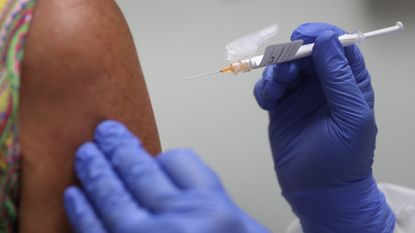Coronavirus: Oxford vaccine ‘may be rolled out within weeks’ - but UK faces jab shortages
Mass production difficulties will limit early supplies

Two Covid-19 vaccines are on the verge of being certified as safe and effective - but production delays mean the first batches may reach no more than a fraction of the UK population.
A homegrown vaccine, developed by Oxford University and manufactured by AstraZeneca, has the “possibility of being ready before the end of the year”, according to Kate Bingham, the chair of the government’s vaccine task force.
She told MPs yesterday that the first three batches of the drug, now in production, “should get us up to about four million doses by the end of the year”. But as The Telegraph points out, the government pledged in May that “30 million vaccines would be ready by September to allow for immediate mass deployment if trials were successful”.
Subscribe to The Week
Escape your echo chamber. Get the facts behind the news, plus analysis from multiple perspectives.

Sign up for The Week's Free Newsletters
From our morning news briefing to a weekly Good News Newsletter, get the best of The Week delivered directly to your inbox.
From our morning news briefing to a weekly Good News Newsletter, get the best of The Week delivered directly to your inbox.
The delay is down to the technical challenge of splicing an immunity-generating protein from the coronavirus with a harmless chimpanzee virus that will carry it into human cells.
“It’s not through lack of care and attention or availability of equipment or anything like that,” Bingham said. “It’s just that this normally takes a very long time.”
Another potential vaccine, developed in Germany by Pfizer and BioNTech, is simpler to manufacture but “contains a type of genetic material known as mRNA that must be stored at minus 70C”, The Times reports. That makes it difficult and expensive to distribute.
The UK has signed deals to buy 350 million doses of a total of six vaccines, all of which are undergoing trials. Once the results are published, the government’s health authorities will decide whether to approve their widespread use.
“The US regulator, the Food and Drug Administration, has said it wanted at least 50% efficacy to approve a vaccine,” The Guardian reports. “But if one was found to prevent 40% of cases, [UK] policymakers would have to consider whether it would be of help to the NHS.”
Create an account with the same email registered to your subscription to unlock access.
Sign up for Today's Best Articles in your inbox
A free daily email with the biggest news stories of the day – and the best features from TheWeek.com
Holden Frith is The Week’s digital director. He also makes regular appearances on “The Week Unwrapped”, speaking about subjects as diverse as vaccine development and bionic bomb-sniffing locusts. He joined The Week in 2013, spending five years editing the magazine’s website. Before that, he was deputy digital editor at The Sunday Times. He has also been TheTimes.co.uk’s technology editor and the launch editor of Wired magazine’s UK website. Holden has worked in journalism for nearly two decades, having started his professional career while completing an English literature degree at Cambridge University. He followed that with a master’s degree in journalism from Northwestern University in Chicago. A keen photographer, he also writes travel features whenever he gets the chance.
-
 'Good riddance to the televised presidential debate'
'Good riddance to the televised presidential debate'Instant Opinion Opinion, comment and editorials of the day
By Harold Maass, The Week US Published
-
 Caitlin Clark the No. 1 pick in bullish WNBA Draft
Caitlin Clark the No. 1 pick in bullish WNBA DraftSpeed Read As expected, she went to the Indiana Fever
By Peter Weber, The Week US Published
-
 Today's political cartoons - April 16, 2024
Today's political cartoons - April 16, 2024Cartoons Tuesday's cartoons - sleepyhead, little people, and more
By The Week US Published
-
 Less than total recall
Less than total recallEditor's Letter Why our brains want to forget the darkest days of the pandemic
By Theunis Bates Published
-
 'A wonky bureaucratic tweak has dramatically changed how Americans drive'
'A wonky bureaucratic tweak has dramatically changed how Americans drive'Instant Opinion Opinion, comment and editorials of the day
By Harold Maass, The Week US Published
-
 Will Aukus pact survive a second Trump presidency?
Will Aukus pact survive a second Trump presidency?Today's Big Question US, UK and Australia seek to expand 'game-changer' defence partnership ahead of Republican's possible return to White House
By Sorcha Bradley, The Week UK Published
-
 It's the economy, Sunak: has 'Rishession' halted Tory fightback?
It's the economy, Sunak: has 'Rishession' halted Tory fightback?Today's Big Question PM's pledge to deliver economic growth is 'in tatters' as stagnation and falling living standards threaten Tory election wipeout
By Harriet Marsden, The Week UK Published
-
 Why your local council may be going bust
Why your local council may be going bustThe Explainer Across England, local councils are suffering from grave financial problems
By The Week UK Published
-
 Rishi Sunak and the right-wing press: heading for divorce?
Rishi Sunak and the right-wing press: heading for divorce?Talking Point The Telegraph launches 'assault' on PM just as many Tory MPs are contemplating losing their seats
By Keumars Afifi-Sabet, The Week UK Published
-
 'Making Russia pay for its aggression with its own assets has undeniable moral and practical appeal'
'Making Russia pay for its aggression with its own assets has undeniable moral and practical appeal'Instant Opinion Opinion, comment and editorials of the day
By Harold Maass, The Week US Published
-
 How would a second Trump presidency affect Britain?
How would a second Trump presidency affect Britain?Today's Big Question Re-election of Republican frontrunner could threaten UK security, warns former head of secret service
By Harriet Marsden, The Week UK Published